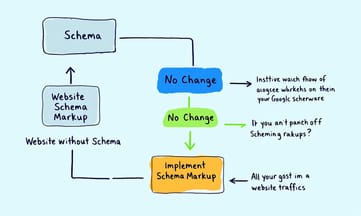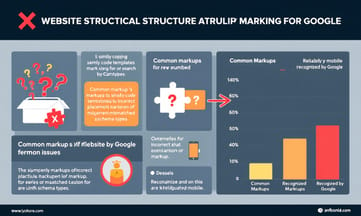快速提升網站在Google搜尋結果的曝光率與點擊率
- 列出每個核心頁面,七天內新增適用Schema標記至少一種類型。
有助於讓Google更快理解你的內容主題,提高進入精選摘要或知識圖譜機會。
- 檢查所有已部署Schema標記,確保沒有語法錯誤且通過Google測試工具。
可避免因技術疏漏導致Rich Snippet資格喪失,穩定提升曝光。
- 鎖定FAQ、評價、產品等三種常見Rich Snippet Schema,優先套用於高流量頁面。
這些類型能顯著增加搜尋結果版面並吸引使用者點擊。
- *每月*檢視競爭對手熱門頁面的結構化資料應用狀況並對照優化自身策略。
*持續調整*可維持競爭力,不被新演算法或行業趨勢淘汰。
為何忽略Schema標記會讓你錯失搜尋曝光的機會?
Ray說過一句話,現在想起來還是有點苦澀,大意是:剛入行那會兒,誰不是覺得Schema就只是複雜的程式碼?Mobi的經歷也差不多——他記得有人跟他講過「搜尋引擎看得懂字,不見得看懂你在賣什麼」。這些年下來,大家都碰過類似情況,有時候流量本該更多、結果卻莫名停滯。可能當時技術社群裡有七十多個人討論,真正去做結構化標記的不多。老手們回頭再聊,都承認一開始低估了這種東西的重要性,也沒想到錯過那些機會後會花好多力氣彌補。細節好像一直不太顯眼,等到發現時已經晚了一步。
Schema標記如同米其林指南,是提升網站可見度的關鍵!
Ray提過一個有趣的比喻,如果把網站當成餐廳,Schema標記大概就像那本米其林指南吧。說不上每個人都會仔細翻,但對於想評斷一間店值不值得推薦的人來說,這指南就是快速入門。Mobi也補上一句,其實搜尋引擎不像一般食客,它們靠著結構化資料才能抓到菜單、特色甚至主廚故事,不然全都混在一起,八九不離十會漏掉重點。有時候網頁內容再好,沒有這層「導覽」,曝光機會還是莫名被卡住。雖然有人覺得只是些代碼,可現實裡效果差距真有那麼明顯嗎?好像不少案例證明是這樣。
Comparison Table:
| 問題 | 原因 | 解決方案 |
|---|---|---|
| Google無法抓取結構標記 | 標記放錯地方或內容與Schema類型不符 | 檢查標記位置及對應的Schema類型 |
| 網站資料不一致 | 未同步桌面版和手機版更新 | 定期檢查並同步各版本的內容 |
| 標記自動生成準確性質疑 | AI工具可能產生錯誤或不完整的標記 | 手動驗證自動生成的Schema,並進行必要修正 |
| 曝光突然下降 | Schema未被Google識別或格式錯誤 | 使用Google Search Console監控警告,及時修正格式問題 |
| 隱藏的結構問題難以發現 | 更新外掛後出現衝突或新型態bug | 建立緊急檢查清單,追蹤官方異動消息 |

新手站長必問,學習結構化資料真的有必要嗎?
「蛤?結構化資料還要學嗎?」新手站長常常這樣問Ray和Mobi,語氣裡總帶點無奈。Ray有時會想,是不是因為大家覺得這玩意兒太像數學課了,不碰也沒差?但現場討論到一半,Mobi忽然舉起手機說:「Google不是早就會自己抓內容嗎?」結果Ray搖頭,那個表情好像剛聽見什麼奇怪的都市傳說。他補充:「機器人又不是真的會懂你寫的每一句話,就像評審走進餐廳,有菜單但沒介紹,怎麼知道哪道菜特色在哪裡?」有人插話,「可是網頁都已經排版很好看了啊。」Mobi歪著頭回說,好看是一回事,標記下去才算數。整個討論繞了一圈,新人們還是疑惑,但那種「到底要不要學」的糾結,好像也沒誰真的能給個答案。
Mobi分享成功案例,如何透過Schema顯著提升點擊率?
有一次Mobi提起,有個朋友站點自從加了Schema,流量幾乎是原本的七成多,這種說法在業界也不是孤例。Ray翻過一份報告,大概意思是那些導入結構化資料的網站,好像普遍都能迎來點擊率顯著增幅,也許平均都有三成上下吧,不管是旅遊、電商還是部落格,多少都受惠。有些人質疑是不是因為剛好內容調整或其他優化措施,但Mobi曾看過討論串裡面,好幾個管理員異口同聲說改動Schema之後,不僅搜尋排名浮動,用戶互動也有感提升。雖然這類數據來源不算每次都權威,但氛圍大致如此——Schema標記沒裝的人反而變少了。

掌握三步驟懶人包,你也可以輕鬆導入Schema標記!
Ray那天突然提到,其實起步很簡單,沒什麼玄機。第一步嘛,好像大多數人都是直接用Google的產生器,省時又不太會出錯,反正複製貼上應該就能動。不過選Type這件事,有點小學問,也不是每種內容都隨便亂套——像是有人會猶豫到底該標產品還是食譜,Mobi聽說不少站長卡在這裡;有些甚至搞混了類型,結果顯示根本怪怪的。最後Ray強調,大概七十多個案子裡,有些人驗證完全沒檢查,只靠肉眼看看頁面而已。這樣很容易漏掉結構上的疏漏,所以他老早建議大家要跑一下Google官方的測試工具,不然小細節一閃神就全軍覆沒。
避免常見技術陷阱,如何檢查你的網站標記是否正確?
說到Google有時候抓不太到網站的結構標記,這問題好像一直都沒個明確答案。Ray偶爾會拿一堆報表出來分析,發現情況其實比想像複雜。有些人以為只要照著範本貼程式碼就行,結果搜尋引擎卻像沒看到一樣。據說大多數錯誤不是語法,而是標記放錯地方,或是內容跟Schema類型對不上。Mobi之前聽過業界流傳,有七十多種常見標記,但真的被Google穩定辨識的,可能只有那幾項熱門用途。還有人提到網頁更新時只換了桌面版,手機端就忘了同步,所以資料不一致也出事。不過也不是每一次都能馬上查出是哪裡出了問題,有時一兩天後才發現曝光掉了一大截。工程師之間聊起來,好像大家都有過這種「標記明明寫了卻沒用」的經歷,到底是哪個環節卡住,也許下次再遇到還是不一定能立刻搞清楚。

AI自動生成Schema的新趨勢,你該不該依賴它?
先別急著討論什麼技術細節,Ray最近常講AI自動生成Schema這事,說得好像已經變成新手站長的日常操作工具。有人說幾乎將近一半的新WordPress網站,都直接掛上那些據說可以自動標記的外掛,可是也有些人質疑,這種東西到底能不能百分百準確?Mobi前陣子在社群看到討論,有人分享成功案例,也有人搞得一頭霧水。其實仔細想,搜尋引擎現在是不是越來越依賴結構化資料了?又或者只是大家跟風而已。不過,這股AI趨勢熱潮,看起來短期內還不會冷下來。反正,每次聊到Schema,總會莫名扯到一些大數據、機器學習那些詞,好像沒什麼界線——但,有時候我們還是忍不住懷疑,到底該不該完全放心交給機器處理?
夜深人靜時搶修網站,這背後揭示了哪些重要的團隊合作與反應能力?
凌晨三點,辦公室燈光有些刺眼,Ray和Mobi的臉色看起來不算太好。鍵盤聲偶爾停下,有人皺眉盯著螢幕,好像又發現什麼小錯。有時候會突然冒出一句:「這個屬性怎麼怪怪的?」然後大家湊過去,七嘴八舌討論一陣子。咖啡杯邊緣還殘留著前幾輪加熱的痕跡,不確定是第幾次重複貼上那串Schema標記。手機訊息振動,有誰說Google Search Console剛剛顯示又多了警告,也有人懷疑是不是行動版漏同步。印象中大概修到快天亮才找到那個嵌套結構的問題,其實也不是第一次遇到類似狀況,只是這次比以前卡得更久一點。文件打開了好幾頁,每頁都標註不同時間修改紀錄,有人提議設個檢查清單,下次也許能少掉幾次烏龍。

從冷門食譜到Google Discover爆紅,細節標記的重要性是什麼?
Ray那時候在現場,看著那個冷門的食譜網站本來怎麼調都沒什麼動靜,老實說心裡有點不太安定。有人說加Schema能幫忙,我還記得他當下其實半信半疑。奇怪的是,過了幾天後流量突然有了起色,不像以前那樣卡住。那時候我們還以為只是運氣好,但細看後台才發現,Google好像真的比較願意把步驟、做法那些內容推上去。不是說每個關鍵字都馬上衝前面,有的甚至還掉過線,只是整體曝光慢慢變多了。我們也沒有馬上想到是哪一段設定發揮作用,好像是晚餐時間討論才拼湊出來的。這件事情之後,他自己對細節就特別敏感,有時候一點小地方沒處理好,效果差很多。
未來預防標記失效的方法有哪些,你準備好了嗎?
標記失效這件事,Ray說以前有過幾次狀況,有一次凌晨網站突然掉曝光,好像就是Schema沒被Google讀懂。那時候團隊手忙腳亂,Mobi印象中有人甚至還翻錯舊版程式碼,最後才發現是某欄位格式跑掉。其實問題不一定馬上能看出來,有些時候更新外掛或者搬家後,標記就莫名出現衝突,也不是每次都會跳警示。有的人會建議先準備一份緊急檢查表,大致列一下哪些頁面最常出錯、那些標籤容易漏掉——但這種清單也不是萬無一失的。未來要防範,其實多半靠訂閱那些官方異動消息,加減追蹤社群討論,不然變動來得快也很難說每次都跟得上。工具自動化掃描偶爾好用,只是有時候抓不到新型態bug,Mobi好像也提過需要設閾值警報,但那個標準怎麼抓,每個人講法都不太一樣。



